法律英语词汇特点
法律英语

法律英语法律英语词汇1、具有特殊法律含义的常用词在英语语言的发展过程中,词义的演变十分复杂。
总体来说,英语词义是在“共时性变化”和“历时性变化”的交替变化中发展演变的。
下列常用词语是人们所熟知的一些单词或词组,然而在法律语言中他们却具有独特的含义,完全不同于在普通语言中的含义。
例如,单词“action”在法律中的含义是“诉讼”:“damage”是造成的“损坏”而“damages”为“损害赔偿金”:“demise”(死亡)在法律中的含义是“转让,遗赠”,这个词经常出现在出租、赠与这类场合,例如:“demise premises”(遗赠房产)。
“consideration”通常指“考虑” “体贴”,而在法律英语中的含义是“对价” “约因”:“instrument”(器具)在法律中的含义是“法律文件”。
法律英语词汇的词义是在英语的发展历史过程中逐步从英语多义词中分离出来的,这类词汇需要一定语境或上下文才能确定词义。
2、古英语和中世纪英语词汇法律英语词汇的另一个特征是经常使用曾经常用、但现在已经很少使用的古代英语和中世纪英语的词语。
古词ye是you 的复数“你们”,在普通英语中已经不再使用了,但在法庭开庭时仍沿用here ye “静听”(宣读、审判)或用古词oyez “静听”。
这里的here ye 实际相当于现代英语中的listen up!古词sayeth等于现代英语中的say ,在普通英语中早已不用了,但在法庭上仍然常用。
法律文本中使用古英语和中世纪英语词语,有助于形成严肃、庄重、正式、紧凑的文体风格。
试看一下一段合约:Provided further that this policy shall be subject to the Conditions herein contained and to any Memoranda endorsed hereon and such Conditions and part of the Policy and the observance and performance by the Insured of the times and terms therein contained so far as they relate to anything to be done by the Insured are of the essence of this contract and shall beconditions precedent to any liability on the part of the Insured under this Policy.上例合约条款选自一份现代的保险合同,但其中herein,hereon ,such全是普通英文中废弃的典型的古旧副词,而其他旧式用法还有provided that ,subject to 等。
法律英语文本的结构和词汇特点
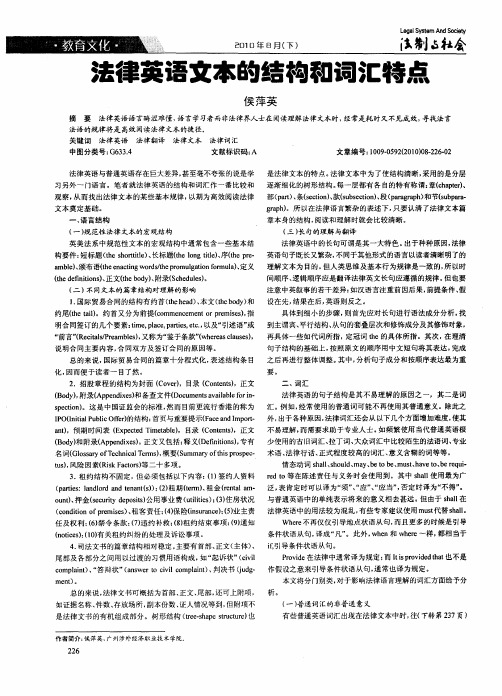
法律 词 汇
文献标 识码 : A 文 章编 号 :0 909 (000.2 -2 10-5 22 1) 2 60 8
法 律英语 与普通 英语存 在 巨大差异 , 甚至 毫不夸 张的说 是学 是法 律文 本 的特 点 。 法律 文本 中为 了使结构 清晰 , 采用 的是分层 每一 层都 有各 自的特 有称 谓: c at ) 章( pe 、 h 词 汇作 一番 比较和 逐渐 细化 的树形 结构
(oy, B d )附录 ( p e d e) A p n i s和备 查文件 ( o u n a a l frn x D cme ta i be o - sv l i
法律 英语 的句 子结 构是 其不 易理解 的原 因之 一 ,其二是 词
setn。这 是 中国证监 会 的标 准 , pco ) i 然而 目前 更流 行香 港的称 为 汇 。 如 , 常使 用的 普通词可 能 不再使 用其 普通 意义 。 例 经 除此 之
明合 同签订 的几个 要素 :mepaepre,t.以及“ t ,l ,a i ec i c ts , 引述语 ” 或 到主 谓宾 、 行结构 、 平 从句 的套 叠层 次和修饰 成分及 其修饰对 象, “ 言”R c a /ra l )又称 为“ 前 ( ei lPembe , ts s 鉴于条款 ” hrac ue) ( ees l ss, w a
( ) 同文 本的 篇章结 构对 理解 的影响 二 不
约尾( e a ) h tl t i 。约首 又分 为前提 ( m n e n o rmi s, c me cme t r e s ) o p e 指
】 国际 贸易 合 同的结构 有约首 ( e ed 、 . t h a ) 本文 ( e o y 和 设 在先 , h t b d) h 结果在 后, 语则反 之 。 英
第二章 法律英语基本特点
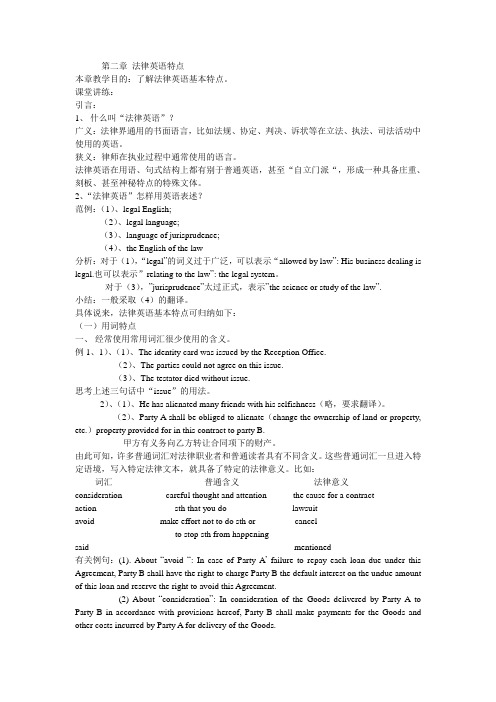
第二章法律英语特点本章教学目的:了解法律英语基本特点。
课堂讲练:引言:1、什么叫“法律英语”?广义:法律界通用的书面语言,比如法规、协定、判决、诉状等在立法、执法、司法活动中使用的英语。
狭义:律师在执业过程中通常使用的语言。
法律英语在用语、句式结构上都有别于普通英语,甚至“自立门派“,形成一种具备庄重、刻板、甚至神秘特点的特殊文体。
2、“法律英语”怎样用英语表述?范例:(1)、legal English;(2)、legal language;(3)、language of jurisprudence;(4)、the English of the law分析:对于(1),“legal‖的词义过于广泛,可以表示“allowed by law‖: His business dealing is legal.也可以表示”relating to the law‖: the legal system。
对于(3),‖jurisprudence‖太过正式,表示‖the science or study of the law‖.小结:一般采取(4)的翻译。
具体说来,法律英语基本特点可归纳如下:(一)用词特点一、经常使用常用词汇很少使用的含义。
例1、1)、(1)、The identity card was issued by the Reception Office.(2)、The parties could not agree on this issue.(3)、The testator died without issue.思考上述三句话中“issue”的用法。
2)、(1)、He has alienated many friends with his selfishness(略,要求翻译)。
(2)、Party A shall be obliged to alienate(change the ownership of land or property, etc.)property provided for in this contract to party B.甲方有义务向乙方转让合同项下的财产。
法律英语的词汇特点
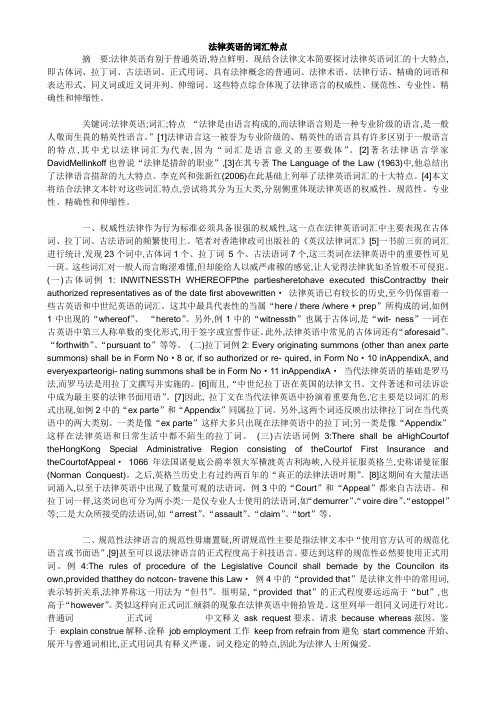
法律英语的词汇特点摘要:法律英语有别于普通英语,特点鲜明。
现结合法律文本简要探讨法律英语词汇的十大特点,即古体词、拉丁词、古法语词、正式用词、具有法律概念的普通词、法律术语、法律行话、精确的词语和表达形式、同义词或近义词并列、伸缩词。
这些特点综合体现了法律语言的权威性、规范性、专业性、精确性和伸缩性。
关键词:法律英语;词汇;特点“法律是由语言构成的,而法律语言则是一种专业阶级的语言,是一般人敬而生畏的精英性语言。
”[1]法律语言这一被誉为专业阶级的、精英性的语言具有许多区别于一般语言的特点,其中尤以法律词汇为代表,因为“词汇是语言意义的主要载体”。
[2]著名法律语言学家DavidMellinkoff也曾说“法律是措辞的职业”,[3]在其专著The Language of the Law (1963)中,他总结出了法律语言措辞的九大特点。
李克兴和张新红(2006)在此基础上列举了法律英语词汇的十大特点。
[4]本文将结合法律文本针对这些词汇特点,尝试将其分为五大类,分别侧重体现法律英语的权威性、规范性、专业性、精确性和伸缩性。
一、权威性法律作为行为标准必须具备很强的权威性,这一点在法律英语词汇中主要表现在古体词、拉丁词、古法语词的频繁使用上。
笔者对香港律政司出版社的《英汉法律词汇》[5]一书前三页的词汇进行统计,发现23个词中,古体词1个、拉丁词5个、古法语词7个,这三类词在法律英语中的重要性可见一斑。
这些词汇对一般人而言晦涩难懂,但却能给人以威严肃穆的感觉,让人觉得法律犹如圣旨般不可侵犯。
(一)古体词例1: INWITNESSTH WHEREOFPthe partiesheretohave executed thisContractby their authorized representatives as of the date first abovewritten·法律英语已有较长的历史,至今仍保留着一些古英语和中世纪英语的词汇。
法律英语词汇的特点及其翻译
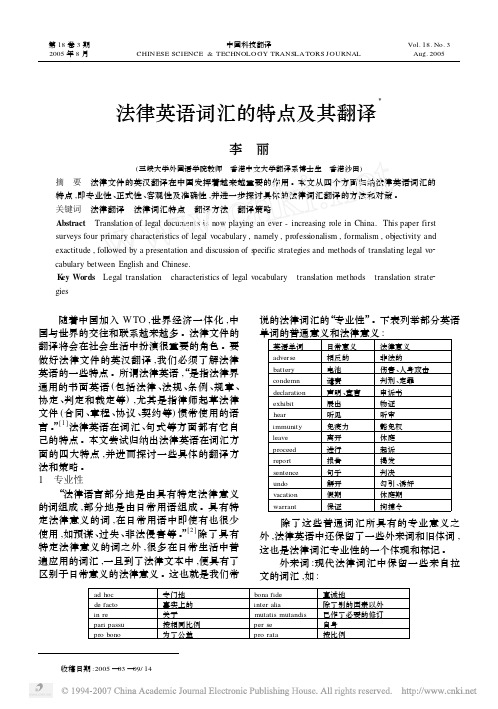
法律英语词汇的特点及其翻译Ξ李 丽(三峡大学外国语学院教师 香港中文大学翻译系博士生 香港沙田)摘 要 法律文件的英汉翻译在中国发挥着越来越重要的作用。
本文从四个方面归纳法律英语词汇的特点,即专业性、正式性、客观性及准确性,并进一步探讨具体的法律词汇翻译的方法和对策。
关键词 法律翻译 法律词汇特点 翻译方法 翻译策略Abstract Translation of legal documents is now playing an ever -increasing role in China.This paper first surveys four primary characteristics of legal vocabulary ,namely ,professionalism ,formalism ,objectivity and exactitude ,followed by a presentation and discussion of s pecific strategies and methods of translating legal vo 2cabulary between English and Chinese.K ey Words Legal translation characteristics of legal vocabulary translation methods translation strate 2gies 随着中国加入WTO ,世界经济一体化,中国与世界的交往和联系越来越多。
法律文件的翻译将会在社会生活中扮演很重要的角色。
要做好法律文件的英汉翻译,我们必须了解法律英语的一些特点。
所谓法律英语,“是指法律界通用的书面英语(包括法律、法规、条例、规章、协定、判定和裁定等),尤其是指律师起草法律文件(合同、章程、协议、契约等)惯常使用的语言。
”[1]法律英语在词汇、句式等方面都有它自己的特点。
法律英语的词汇特点

• Bill Time Bill /overdue bill /
2、古体词和配对词
• This contract is made the 4th day of July, 1996
by and between Away (China) daily necessities company Limited (hereinafter
• Rights and interests • the Rights and Interests of Women and Children
• Aid and Comfort • Clause 1:Treason against the United States, shall consist only in
inclusive of your 2% commission.
古体词B
• Herewith • Please sign the document enclosed herewith. • My resume is enclosed herewith. • Thereto • The relevant inspecting organs shall give
assistance thereto. • The signature on a negotiable instrument
shall be the true name of the party thereto.
Doublets(legal pairs)
• Null and void • The contract was declared null and void.
法律英语的特点
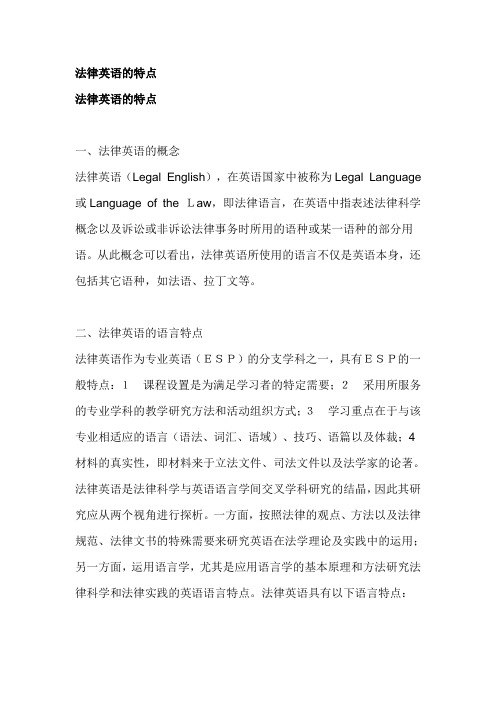
法律英语的特点法律英语的特点一、法律英语的概念法律英语(Legal English),在英语国家中被称为Legal Language 或Language of the Law,即法律语言,在英语中指表述法律科学概念以及诉讼或非诉讼法律事务时所用的语种或某一语种的部分用语。
从此概念可以看出,法律英语所使用的语言不仅是英语本身,还包括其它语种,如法语、拉丁文等。
二、法律英语的语言特点法律英语作为专业英语(ESP)的分支学科之一,具有ESP的一般特点:1课程设置是为满足学习者的特定需要;2采用所服务的专业学科的教学研究方法和活动组织方式;3学习重点在于与该专业相适应的语言(语法、词汇、语域)、技巧、语篇以及体裁;4 材料的真实性,即材料来于立法文件、司法文件以及法学家的论著。
法律英语是法律科学与英语语言学间交叉学科研究的结晶,因此其研究应从两个视角进行探析。
一方面,按照法律的观点、方法以及法律规范、法律文书的特殊需要来研究英语在法学理论及实践中的运用;另一方面,运用语言学,尤其是应用语言学的基本原理和方法研究法律科学和法律实践的英语语言特点。
法律英语具有以下语言特点:词汇特点一、准确用词与模糊语言的同时出现法律语言,尤其是立法语言常把准确性与模糊性这一矛盾纳入同一法律规范。
根据严格解释原则,在适用法律时,书面文字是法官解释法律文件的唯一依据,因此法律语言用词造句必须十分准确。
法律语言尤其是立法语言中很少使用描绘性形容词,而且对表示时间、范围、程度等副词使用极为严格,为了避免不必要的歧义。
同时,为了追求语意确切、论证周详,法律语言中常使用同义、近义词,如《香港刑法摘要》(D igest of Hong Kong Criminal Law)第八章关于“参加暴动并阻碍船舶、飞机、或者铁路列车罪”中规定“It is an offence for any perso n taking part in a riot to unlawfully and with force (a)prevent , hinder or obstruct ,or attempt to prevent, hinder, or obstruct, t he loading or unloading, or the movement of ; or (b)board, or attempt to board with intent to do so ; any motor vehicle ,tra mcar ,aircraft ,train or vessel . 然而在现实中,有许多案子是由于对法律文字的理解不一造成的,这就有赖于法官在具体案件中对法律条文进行解释。
法律英语词汇特点
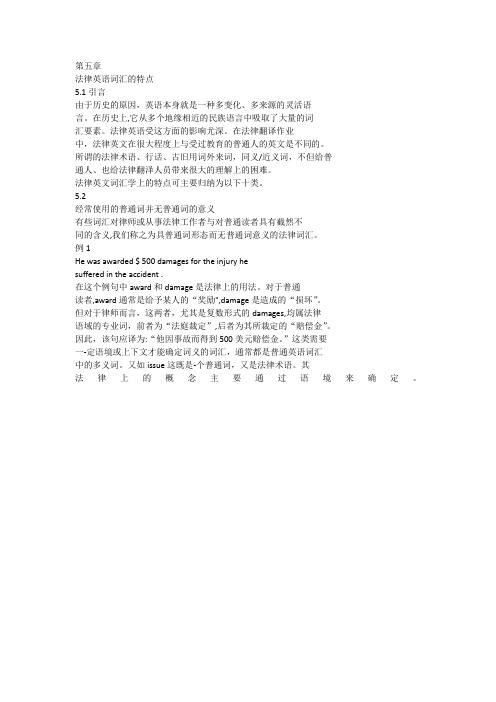
第五章法律英语词汇的特点5.1引言由于历史的原因,英语本身就是一种多变化、多来源的灵活语言。
在历史上,它从多个地缘相近的民族语言中吸取了大量的词汇要素。
法律英语受这方面的影响尤深。
在法律翻译作业中,法律英文在很大程度上与受过教育的普通人的英文是不同的。
所谓的法律术语、行话、古旧用词外来词,同义/近义词,不但给普通人、也给法律翻泽人员带来很大的理解上的困难。
法律英文词汇学上的特点可主要归纳为以下十类。
5.2经常使用的普通词并无普通词的意义有些词汇对律师或从事法律工作者与对普通读者具有截然不同的含义,我们称之为具普通词形态而无普通词意义的法律词汇。
例1He was awarded $ 500 damages for the injury hesuffered in the accident .在这个例句中award和damage是法律上的用法。
对于普通读者,award通常是给予某人的“奖励",damage是造成的“损坏”。
但对于律师而言,这两者,尤其是复数形式的damages,均属法律语域的专业词,前者为“法庭裁定”,后者为其所裁定的“赔偿金”。
因此,该句应译为:“他因事故而得到500美元赔偿金。
”这类需要一-定语境或上下文才能确定词义的词汇,通常都是普通英语词汇中的多义词。
又如issue这既是-个普通词,又是法律术语。
其法律上的概念主要通过语境来确定。
如何辨别这些具有特殊法律意义的普通词汇?当然,这并非一件易事,需要定的专门篇幅加以阐述。
但除了上述的“语境分析”以外,可作为补允的原则还有两条:1)熟悉所涉及的普通型词汇的专门意义;以及2)逻辑推理。
5.3频繁使用当代普通英语极少使用的古旧词汇当今普通英语的词汇主要来自古代及中世纪时期的英语,但今日大部分的英语词汇的意义与一千多年前、甚至几百年前已经大不相同,用法也大不一样。
但是,在如今的法律英语中,许多这类词汇的意义及其用法仍然-如既往、千年不变。
- 1、下载文档前请自行甄别文档内容的完整性,平台不提供额外的编辑、内容补充、找答案等附加服务。
- 2、"仅部分预览"的文档,不可在线预览部分如存在完整性等问题,可反馈申请退款(可完整预览的文档不适用该条件!)。
- 3、如文档侵犯您的权益,请联系客服反馈,我们会尽快为您处理(人工客服工作时间:9:00-18:30)。
(4)外来词语的使用 loan words or phrases 拉丁词汇 “actus legitimus(合法行为)” “ad hoc (特别,特定;临时;特殊)” “ad referendum(尚待核准,待进一步审议)” “amicus cruiae (协助法庭解释某类法律问题的人,„法庭之友’ )” “animus (意愿,意图;心素)” “arguendo (for the sake of argument 在争辩中)” “bancus(法院;法官席)” “billa vera (正式的起诉书)” “bona fide (真诚地,善意地辩正当地)” “cadit quaestio (辨论终结)” “capias(拘票,拘捕令;令状)” “certiorari (上级法院向下级法院调取案卷复审的令状)” “coemptio (买卖婚姻)” ” coram(在某人面前)” “corpusj uris (法典,法令大全)” “de jure (法律上,按照法律的,合法 的)”
用词特点
(1)词汇重复 (The repetition of lexical items) Eg: “The church must comply with the requirements of the zoning and building codes before it may legally operate its school . Each of these codes makes accommodation for uses that legally existed prior to enactment of the code. However, the church never operated a school prior to the codes’ enactment, so full compliance with the codes is required for the new use involved in operating a school .”
法语 “appeal”、“assault”、“contract”、“damages”、 “defendant”、“heir”、“larceny”、 “lien”、 “mortgage”、“plaintiff”、“pleadings”、 “reprieve”、“tort”、“treason”、“trespass”、 “verdict” “cestui que trust ( = beneficiary „信托收益人’ )” , “cy - pres = as near as possible1 „尽可能地,力求 近似;近似原则’” “en ventre sa mere ( = in its mother‟ s womb,„腹 中胎儿,待生胎儿’” “feme covert = married woman „有夫之妇,已婚女 子’” “save = except„除 ⋯⋯之 外’” “seisin/ seizin = possession or ownership „占有 物;占有土地,土地的占有;依法占有的财产’
用词特点(cont.)
(5)法律术语和行话的使用/Terms of art and Argot 法律术语根据大卫· 麦林科夫(David Melinkoff)的解释, 是“具有特定意义的专门化词” (a technical word with a specific meaning) ,根据布赖恩·A· 加纳的解释, 是“在某一特定专业中具有特定、准确意义的词集 ( words having specific , precise significance in a given specialty)” “certiorari”就是一个法律术语,它出现在法律文件之中, 意思是“上级法院向下级法院发出的调取案卷进行复 审的令状” ,但实际法律生活中,人们都会从文化背景 范围内去了解该词的确切含义,现在人们使用该词时都 会明白法律工作中上诉程序的运行情况,上级法院的自 由裁量权的大小,也都明白一国最高法院到底是如何选 择它来听审案件的。
用词特点(cont.)
“decessit sine prole (死后无子女)” “dies cedit (权利义务成立期,债权发生日期)” “dolus antecedens (事前犯意)” “durante lite (诉讼进行期间)” , “en banc (全体出庭法官听审)” “et alii (以及其他事项,以及其他等等)” “Expressio unius est exclusio alterius. (明示其一即排斥其他)” , “Falsus in uno ,falsus omnibus. (一事假,事事假)” “ fieri facias (财物扣押令,扣押债务人动产令)” “habeas corpus(人身保护令状)” “inter alia (among other things 在其他事物中/除了别的以外/特别是/其中包括)” “juscriminale (刑法)” “lex situs = lex rei sitae (物所在地法)” per curiam( by the court 依法院/为法院所定/引用法官判词)” “prima facie (初步的;表面的)” , “pro bono (为了 ⋯⋯的利益)” , “quorum(法定人 数)” “res judicata (既决案件;已判决的事项/事件)” “seriatum (in turn/ serially/ one after another 依次/逐条)” Stare decisis(遵循先例,因循先例) “supersedeas(中止执行令;中止诉讼令状)” , “stare decisis(服从先例原则,遵照先 例原则;根据判例)”“vis major (不可抗力;不能抵抗的力量)”
用词特点(cont.)
(3)古词、旧词的频繁使用 frequent Use of the archaic words or phrases Esp. archaic adverbs and prepositional phrases aforementioned ( =previously mentioned), aforesaid ( = above) ,behoove ( = to be necessary/ tobe proper) ,foregoing ,forthwith ( = immediately) , henceforth( = from now on) , hitherto ( = until this time/ up to now) ,pursuant to ( = under/ according to) hereafter , herebefore ,hereby ,herein ,herinabove ( = above) ,hereinafter ,hereinunder( = below) , hereof , heretofore ( = before/ up to this time) ,hereunder , herewith ( eg. enclosed herewith = enclosed)
用词特点(cont.)
(2)并列使用近义词或同义词 concurrent use of synonym and near synonyms (sometimes redundancy__doublets or triplets ) Eg:“The servantt’ s liability stems from the duty owed to a third person under the law requiring the servant to act so as not to injure others.” Other examples: acknowledge and confess (供认;承认) aid and abet(教唆) alter and change (变更) any matter,fact or thing(一切事情/一切事项) breaking and entering (闯入) Cancel, annul and set aside(取消) cease and desist (制止) false and untrue (非真实的,虚假的)
法律英语词汇特点
郑达轩
法律语言/法律英语 (langue of the law)
语言文学(language and literature) Communicative language 专门用途英语(English for special purposes, ESP): greater specialization in the teaching of English 行业用途语言(English for Professional Purposes, EPP) Language for trade, marketing, tourism, legislation, policy-making Legal English International organizations and institutions, government agencies or departments, multinational corporations, import-export firms, the media, the film and tourist industry, information technology, web activities (foreign offices conducting international businesses, national or international courts, legal form and methods for diplomatic controversies, judicial and arbitral proceedings etc.)
